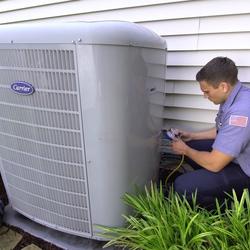Can a New Air Conditioner Reduce Your Cooling Bills?
The short answer? Yes, a new air conditioner will be more efficient and reduce your cooling bills.
That said, a new, high-efficiency air conditioner may not always save you money in the long run. You could end up paying more for the high-efficiency AC than you would save in cooling bills for the lifespan of the new AC.
To help you find an AC that will save you money overall, we’ll go over the following:
Want a free quote for a new AC?
Our NATE-certified technicians will inspect your home and discuss with you your cooling needs to help you find the most efficient AC for your home. Contact us today to get an in-person, no-obligation estimate or learn more about our AC installation services.
How a new air conditioner can reduce cooling bills
Air conditioner efficiency is measured by a Seasonal Energy Efficiency Ratio (SEER). The minimum standard SEER for AC units is 13 in Richmond, but you can get units with SEER ratings up to 25.
SEER measures a unit’s cooling output compared to its energy consumption. You can think of a SEER rating the way you do your car’s fuel efficiency (miles per gallon): the higher the rating, the less fuel the system requires to run.
That means ACs with higher SEER ratings will cost less in monthly energy bills than units with lower SEER ratings. So, if your current system has a SEER of 14, you’ll definitely see lower cooling bills by installing a 20-SEER system.
For example, according to seerenergysavings.com, you could see roughly 30% savings per year in Richmond by upgrading from a 14-SEER unit to a 20-SEER one.
However, the cost to install an AC increases with energy efficiency, which means you’ll pay more money upfront for a 20-SEER unit than you would for another 14-SEER one.
In the example above, seerenergysavings.com estimates that you could save up to $1,200 over 10 years upgrading to a 20-SEER unit. You’ll want to make sure those savings are greater than the cost difference of the more efficient unit compared to a new, lower-efficiency unit. If the savings are lower, you may be better off going with a lower-efficiency unit.
To choose the right AC for your home, especially one that will save you money in the long run, you’ll need one that’s properly sized.
Getting the right size air conditioner for your home
Air conditioners are sized in British Thermal Units (BTUs), which measures how much heat the system can remove from a home.
The more BTUs a system has, the more heat it can remove from your home. Residential ACs generally range anywhere from 12,000 to 60,000 BTUs.
That said, you can’t just go with a larger system to cool your home faster. We’ll explain why.
Importance of proper AC sizing
It may be tempting to choose a smaller AC to save money or a larger one to keep your home cooler, but both will cost you more money down the road.
Going with an over-or undersized AC will cause:
- More expensive energy bills. An undersized unit will constantly run (running up your cooling bills) to keep up with your cooling demands, while an oversized one will short cycle. Short cycling is when the system turns on and off frequently trying to cool your home. Since ACs use a lot more energy turning on than they do when they’re running, you’ll see higher energy bills.
- Hot or cold spots in your home. The frequent short cycling of oversized units sends short bursts of air that will cool parts of your home but won’t run long enough to cool your entire home completely. On the other hand, an undersized unit will run non-stop but won’t keep up with how cool you want your home.
- Shortened system lifespan. An AC starting up puts much more stress on the parts than consistent running, which is why oversized units wear out faster than properly sized ones. The constant running of undersized units also puts excess stress on an AC, causing the unit to die quicker than one fit for your home.
How to size an AC
To size an air conditioner for your home, a professional will need to perform a “cooling load calculation,” which measures how much heat the unit needs to remove from your home.
A cooling load calculation measure factors like:
- Your home’s square footage
- The number, size, and orientation of your home’s windows and doors
- The direction your home faces
- How many people live in the house
- The quality of your home’s insulation
- Whether your yard has a lot of trees
- The type of flooring your home has
- And much more
As you can see, a lot goes into sizing an AC for your home, which is why we recommend leaving the job to a professional that has the right tools and experience.
Proper sizing of an AC will help prevent you from having to replace your system sooner than you have to.
When to replace your air conditioner
Our cooling experts at Michael & Son recommend replacing your AC when:
- Your AC is 15+ years old. Most air conditioners only last around 20 years. If yours is approaching the 15-year mark, it will likely die or start needing a lot of repairs soon. Plus, if yours is that old, you’ll undoubtedly see lower cooling bills with a newer, more energy-efficient system.
- Energy bills are increasing. As air conditioners age, they lose efficiency. If you’ve noticed steadily increasing cooling bills (and haven’t increased your energy usage), that could mean your AC is getting too old to be efficient.
- Your unit needs repairs more frequently. When your system starts needing a lot of repairs, that’s usually a sign that the unit is on its way out. If you start seeing multiple expensive repairs within months of each other, you may want to put that money towards a new unit instead.
We know footing the bill for a new AC is a big investment, which is why we also offer leases on AC systems. You can learn more about leasing an AC unit in our blog “Benefits of Owning vs Leasing an HVAC Unit” or on our Unlimited Program page.
Need a new AC? Call Michael & Son for a free estimate.
At Michael & Son, we offer honest, upfront pricing for all AC installations. Our cooling techs provide exceptional customer service and answer any questions you have about reducing cooling bills with a new AC. We’ll help you find the right AC system for your home.
This blog was written on Sep 27, 2021. Any pricing information is subject to change.


